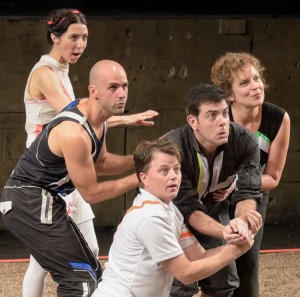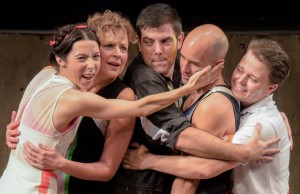A Midsummer Night’s Dream, streamlined to 90 minutes and staged outdoors by Classical Theatre of Harlem, is as cool and fizzy as a glass of Prosecco. Judging by the wild guffaws and applause on opening night, the zanies who populate this most fanciful of Shakespeare’s comedies (embodied by a top-flight cast of youthful New York actors) kept a steady hold on playgoers’ attention, despite the distraction of sirens punctuating the Bard’s iambic pentameter, helicopters overhead, and heat only slightly below the day’s high of 90 degrees Fahrenheit. At a dramatic moment, an explosion of amateur fireworks just outside the amphitheater added a fortuitous burst of red and orange to the twilit sky, eliciting a gasp of audience amusement.
Midsummer: A Banquet
Food might not be the primary theme one would look for in Shakespeare, but Food of Love and Third Rail Projects have hit upon it, with pleasantly surprising results, in Midsummer: A Banquet at Café Fae, an unusual performance venue just south of Union Square. From the title it’s easy to guess that A Midsummer Night’s Dream is the production; it’s not easy to predict the rest.
Shakespeare With Tears
You’re not ever likely to see a staging of A Midsummer Night’s Dream similar to that at the Pearl Theatre Company, a co-production with the Hudson Valley Shakespeare Festival. That’s almost certainly a blessing. Directed by Eric Tucker of Bedlam, a company known for its pared-down renderings of classics—including a powerful Saint Joan and Hamlet—A Midsummer Night’s Dream currently on the boards is a misbegotten mess. Somewhere underneath the countless irrelevancies encrusting this version may be a play about lovers, poets and fools, but despair at finding it sets in quickly.
Bedlam uses no props, so there’s a lot of miming of them; some you won’t expect. Early on, Hermia is tied up and her arms winched into the air as if she’s about to be interrogated by black-ops agents rather than Theseus. Anyone who has ever seen a traditional version of A Midsummer Night’s Dream may wonder what is going on—as will anyone who hasn’t. The five actors are not only responsible for imagining their props, but they take on multiple roles and produce their own sound effects. In fact, there is so much accumulated shouting and stage business that the story barely comes through, let alone the poetry.
Tucker has introduced action to accompany virtually every line. When Egeus complains that Lysander “bewitched the bosom of my child,” Lysander air-squeezes Hermia’s imagined breasts. When Jason O’Connell’s Bottom speaks of “a tyrant,” his hands become pistols and he shoots them. O bad tyrant! Looking for his comrades, Bottom says, “Where are these hearts?” That leads O’Connell to pull an imaginary one from his chest and gnaw it like Hannibal Lecter. Everything must be illustrated, no matter how inappropriately, in this Shakespeare for Imbeciles production.
It’s not enough to pile on irrelevancies: Tucker has vulgarized the play as well. When Mark Bedard’s Oberon says, “I do but beg a little changeling boy to be my…henchman,” the pause he inserts suggests latent pedophilia. When the actors cluster together late in the play (as they often do to become scenery, though not in this case), there’s suddenly an orgiastic scene of hip-thrusting intercourse and tongue work. When Puck returns to Oberon with the flower love-in-idleness, he doesn’t have it in hand. Oh, no, it’s down his throat so he can hawk loudly and puke it out!
Amid this goulash, Nance Williamson shows the best command of poetry, both as the brusque Hippolyta and lumbering Helena. Bedard recites the verse clearly enough, but doesn't quite find the music in it. O’Connell is egregiously irritating as Puck, Bottom, and Pyramus. As the last, he yells for Thisbe in the style of Marlon Brando as Stanley Kowalski in A Streetcar Named Desire. (He also does an impression of Al Pacino in Bottom’s “shivering shocks” speech, and they’re amusing, but unnecessary.)
The performers may be excused, given all that Tucker has taxed them with. They contribute constant sound effects and movement: weird noises, rolling around, wrestling, humming the music from Jeopardy and “The Girl from Ipanema,” grunts, clasping one another, shrieks, falling to the ground in an instant, tsk-tsks and putting on silly accents (Sean McNall’s Demetrius seems to be Spanish by way of Scotland; Bedard’s Thisbe has a Southern twang). Scarcely a sentence goes by without some enhancement. Oberon’s speech “The next thing then she waking looks upon/Be it on lion, bear, or wolf, or bull/On meddling monkey, or on busy ape/She shall pursue it with the soul of love” cues an aural zoo as the actors contribute the sounds of each animal mentioned. But nothing is so impressive as the rare moments when the words are left to be heard on their own—Bedard’s Oberon, speaking of a “boar with bristled hair,” or Helena’s late soliloquy. It’s then one realizes what quality the actors might be capable of.
Heaped with praise by critics at the The New York Times and The Wall Street Journal, this production of A Midsummer Night’s Dream was clearly not to the taste of a scowling woman speaking to a friend at intermission. Passing by, I overheard only the word “indefensible.” Whether it applied to those reviews or to the production itself, she was on the money.
A Midsummer Night's Dream plays through Oct. 31 at the Pearl Theatre (555 West 42nd St. between 10th and 11th Aves.) in Manhattan. Evening performances are at 7 p.m. on Oct. 7, 11, 12, 15, 20, 28 and 29 and at 8 p.m. on Oct. 9, 16, 17, 23 and 30. Matinees are at 2 p.m. on Oct. 8, 10, 14, 17, 18, 21 and 31. For tickets, call 212- 563-9261 or visit PearlTheatre.org.










